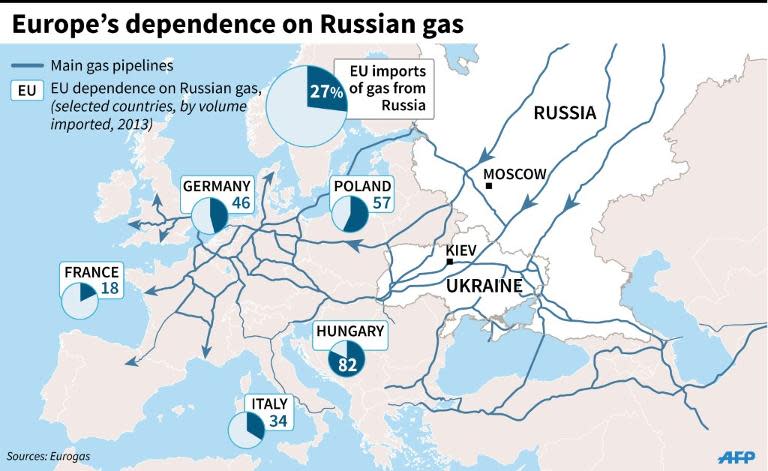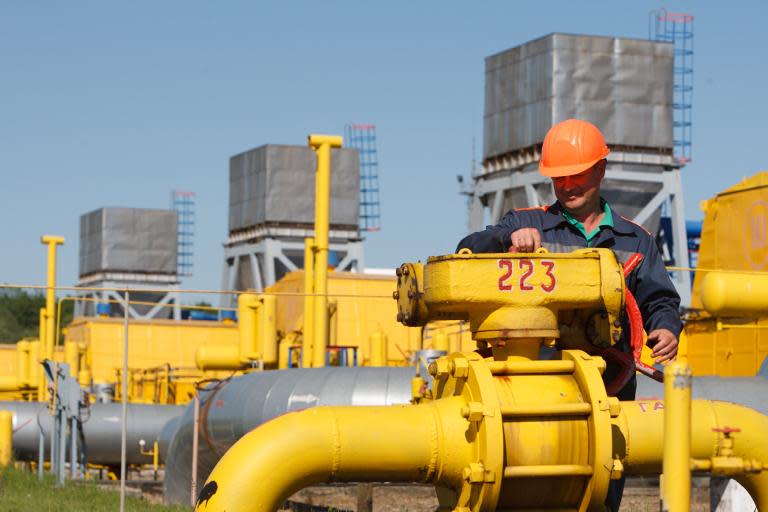Russia, Ukraine agree gas delivery deal until end March: EU
Moscow and Kiev agreed a gas delivery deal until the end of March after EU-brokered talks in Brussels Monday, securing supplies to Europe after a row over supplies to rebel-held eastern Ukraine, the EU said. Gazprom, the Russian state-owned gas giant, threatened last week to halt deliveries to Ukraine and divert stocks instead to the eastern parts of the country controlled by pro-Kremlin separatists after Kiev cut them off. "I am satisfied that we managed to safeguard the full application of the Winter Package for the supply needs in Ukraine," said Maros Sefcovic, European Commission Vice-President for Energy Union, referring to a contract expiring on March 31 that Russia had threatened to scrap. "We also agreed to take up trilateral negotiations on the follow-up to the Winter Package. I am reassured that the supply of gas to the EU markets remains secure," Sefcovic said in a statement. The deal came at the end of nearly five hours of talks between Sefcovic, Russian Energy Minister Alexander Novak and his Ukrainian counterpart Volodymyr Demchyshyn. The row had threatened to disrupt gas supplies to the European Union, which receives about a third of its gas from Russia, with half that amount transiting via Ukraine pipelines. The two sides agreed to leave gas supply to the rebel areas of Donetsk and Lugansk out of the negotiations for now and discuss it later, the EU statement said, adding that the issue was "highly complex in legal, technical and political terms." They would meet again for talks on the so-called Summer Package before the end of March, the statement said. - 'Bridge differences' - EU Foreign Policy chief Federica Mogherini hailed the deal, which comes despite relations between Brussels and Moscow being at their worst for decades due to the crisis in Ukraine. "The outcome of today's meeting on energy issues can help bridge differences over the supply of gas between Ukraine and Russia," she said. The talks are the latest in a series that Brussels has hosted over the past year to resolve the gas crisis facing Ukraine. Tensions flared anew last month when Gazprom began supplying gas directly to separatist-held areas in eastern Ukraine and demanded Kiev pay for it. Rebel leaders in east Ukraine said that Kiev had suddenly ceased gas supplies and asked for access to gas from Russia. Naftogaz, Ukraine's national gas company, confirmed the cut, saying it was due to pipeline damage caused by fighting. Both gas firms were represented at the talks. Russian President Vladimir Putin has said that Kiev's move to cut gas supply smacked of "genocide" and targeted four million people living in the area. In earlier disputes in 2006 and 2009, Gazprom halted deliveries to Kiev, causing huge disruption to European gas supplies at the height of winter. Russia has long been concerned about Ukraine's growing closeness to the West. The latest crisis in Ukraine was sparked when former leader Viktor Yanukovych rejected an association deal with the EU, leading to protests that resulted in his overthrow. The EU has since imposed sanctions on Russia over the annexation of Crimea from Ukraine and its alleged support for the separatists. Moscow denies backing the rebels.

 Yahoo Finance
Yahoo Finance 


